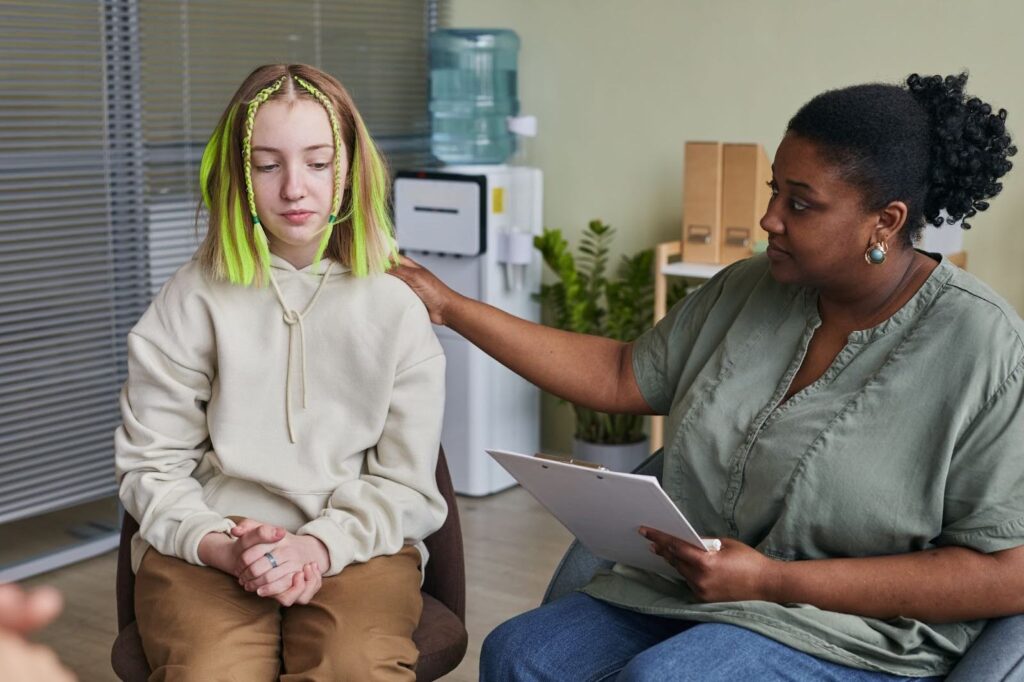
Teenagers face emotional storms their parents never saw coming. Their world moves faster, louder, and with higher stakes. Every mistake feels public; every pressure feels personal. Social media, academic stress, and identity confusion push many to the edge. That’s why families are asking a crucial question: Does counseling work for teens?
Understanding the Need for Counseling for Teens
Adolescence isn’t just about growth spurts and mood swings. It’s a chaotic mix of mental, emotional, and social changes. For some teens, this period becomes a battleground. Counseling exists to catch those who feel like they’re falling through the cracks.
The Growing Mental Health Crisis in Adolescents
Across the globe, more teens are battling mental health challenges. Anxiety, depression, and self-harm rates are rising each year. Many young people feel overwhelmed, particularly when trying to balance their school, home, and online lives. The pressure to “have it all together” often masks deeper struggles. Without proper support, these issues can escalate and impact everything from academic performance to basic daily functions. Counseling creates space for teens to confront what they can’t handle alone.
Why Teens Struggle to Open Up
Teens often feel misunderstood or dismissed by adults. They fear judgment or believe their problems aren’t worth discussing. Many lack the language or confidence to explain what they’re going through. Silence becomes a defense, even when it’s hurting them. Counseling breaks that silence by providing a safe and neutral space. It teaches teens how to identify and express their emotions and build trust through open and honest conversation.
How Counseling for Teens Works
Effective teen therapy doesn’t follow a one-size-fits-all approach. Counselors tailor sessions to meet the individual’s needs, taking into account their age, personality, and specific concerns. These sessions aren’t just about venting; they’re structured to help teens grow emotionally and mentally.
The Basics of Teen Therapy
Counseling for teens encompasses various types of therapy, including individual, family, and group sessions. Therapists employ strategies such as cognitive behavioral therapy (CBT) or solution-focused therapy. These tools help teens understand how their thoughts influence their behavior. Sessions remain private, which encourages honesty and openness. Building trust is a key goal in the early stages of the relationship. Once a teen feels safe, therapy can start making a difference.
Common Issues Addressed in Teen Counseling
Teen counseling addresses a wide range of emotional and behavioral concerns. These include anxiety, depression, grief, and trauma from bullying or family conflict. Some teens deal with identity struggles or peer pressure that affects their confidence. Others need help with academic stress, panic attacks, or obsessive thinking. Counselors guide them through these challenges with compassion and structure. As a result, teens learn how to manage stress, set healthy boundaries, and enhance their self-esteem.
Is Counseling for Teens Really Effective?
When done right, counseling offers more than comfort; it drives change. Research, feedback from families, and progress seen in schools all point to tangible benefits. The more teens engage, the more lasting the results become.
Real Outcomes From Real Sessions
Studies consistently show that therapy helps reduce anxiety and depression in teens. Many report feeling more confident, stable, and hopeful after regular sessions. They begin to sleep better, communicate more effectively, and adopt healthier routines. Some even see improvements in academic performance or social behavior. These shifts often occur gradually, accumulating over time. Most importantly, teens begin to believe they can handle life’s challenges.

How Teens Benefit in the Long-Term
The impact of therapy doesn’t fade after a few months. Teens carry the skills they learn well into adulthood. They begin to recognize emotional triggers and manage them without fear. That leads to better relationships, more intentional decision-making, and improved mental resilience. Counseling helps teens define their values and understand their feelings. With those tools, they grow into more grounded and emotionally aware adults.
Comparing Counseling With No Intervention
Teens who attend therapy often show better outcomes than those who don’t. Without guidance, many teens bottle up stress, which can lead to harmful behavior. Therapy offers a safe outlet for emotions and helps stop unhealthy patterns early. In contrast, untreated mental health struggles tend to resurface later in life. Even short-term counseling can interrupt cycles of self-doubt or avoidance. The presence of support itself can be a turning point for many teens.
What Makes Some Teens Resistant to Therapy
Not every teen responds to counseling in the same way. Some go into therapy guarded or skeptical, unsure of what to expect. They may have been forced to attend or fear judgment from others. A lack of connection with the therapist can slow progress. However, resistance often fades once the teen feels heard and respected. Patience, consistency, and freedom to speak honestly help overcome this barrier.
What Makes Counseling for Teens Successful
Success in teen counseling doesn’t happen by accident. Several elements shape the outcome of therapy. These include the relationship with the therapist, support at home, and the teen’s willingness to engage in treatment.
The Role of the Therapist
A skilled therapist doesn’t just listen; they relate. They tailor their approach to the teen’s age, background, and specific challenges. Their job is to create a space where teens feel seen, not judged. Humor, empathy, and patience go a long way. When teens connect with their counselor, progress speeds up. That bond becomes a foundation for emotional growth.
Family Involvement and Support
Family involvement can either help or hinder therapy. When parents stay supportive and informed, teens feel more secure. Counseling often includes strategies for better family communication. Some therapists invite parents into sessions to work on shared goals and objectives. When change occurs at home, it reinforces what is learned in therapy. A supportive environment provides teens with a stronger chance of recovery.
What Hinders Effective Counseling for Teens
Despite its benefits, not every teen gets the help they need. Some face hurdles that prevent therapy from working or even starting. These barriers include stigma, lack of access, and resistance to the process.
Stigma and Misunderstanding
Many teens avoid therapy because they don’t want to be seen as weak. Their peers may mock or misunderstand the idea of mental health care. In some homes, therapy is still viewed as a last resort. These outdated beliefs discourage teens from seeking help. Educating families and schools about mental health reduces this stigma. Normalizing counseling makes it easier for teens to ask for support.

Accessibility and Cost
Finding quality counseling can be difficult for many families. Some areas lack licensed teen therapists or mental health clinics. Even when services are available, they might be too expensive. Insurance coverage varies, and waiting lists can stretch for months. Teens in rural or underserved communities are hit the hardest. Without early support, their struggles may deepen over time.
How to Know if Teen Counseling is Working
Therapy isn’t always a quick fix. But some signs show when things are starting to change. Families and teens should watch for both subtle and noticeable progress.
Signs of Positive Progress
When therapy is effective, the teen may appear calmer or more connected. They might start opening up more and avoiding past negative behaviors. Sleep, eating habits, and school focus can also improve. Over time, you may notice fewer emotional outbursts or breakdowns. These changes show that the teen is learning to regulate and reflect. Even small gains point to more profound internal shifts.
What to Do if it Isn’t Helping
Sometimes, therapy stalls or doesn’t click right away. The issue may be due to an inappropriate therapeutic approach or a poor therapeutic fit between the therapist and the patient. If progress feels stuck, it’s okay to switch to a new professional. Teens need someone they feel comfortable with, not just someone available. Parents should talk openly with their teens about how they feel after sessions. Reassessing therapy goals can reignite momentum and clarity.
Cultural Sensitivity in Counseling for Teens
Not every teen enters therapy with the same background or worldview. Cultural values, religious beliefs, and family traditions all shape how a teen sees mental health. Counselors must understand these differences to connect and support effectively. When therapy feels culturally safe, teens are more likely to stay engaged.
Why Cultural Competence Matters in Teen Counseling
Teens from minority communities often face extra layers of stress. These include racism, identity struggles, or pressure to conform at home and school. A culturally aware therapist avoids making assumptions and listens with an open mind. They ask about the teen’s values, family dynamics, and communication style. By showing respect for these differences, the counselor builds trust and avoids missteps. This approach helps teens feel seen, not stereotyped.
Adapting Therapy to Individual Beliefs and Values
Therapy shouldn’t ask teens to leave their culture at the door. Counselors can adjust language, goals, and strategies to fit personal or spiritual values. For example, some teens may value privacy, loyalty to family, or faith-based coping methods. These aren’t roadblocks; they’re entry points for healing. A therapist who honors these values builds a stronger bond. This respect helps therapy stick, even in complex cultural situations.
Support Counseling for Teens Without Delay
Teens rarely shout for help; they hint, withdraw, or go quiet. That silence can be loud if you know how to hear it. Counseling isn’t about fixing a broken child. It’s about offering tools before pressure turns to pain before confusion becomes isolation. If something feels off, don’t wait for a crisis to confirm it; take action now. Getting support now could be the moment your teen finally feels understood and chooses to speak.
Looking for more insight on teen mental health? Visit the Moving Forward, PLC blog and subscribe to our newsletter for expert tips delivered monthly.
